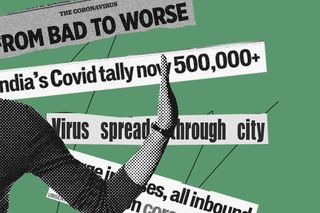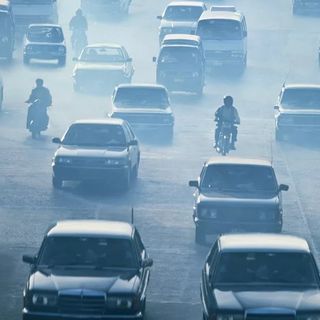
Is Crisis Fatigue Leading Us to Avoid the News?
People are using distraction or avoidance as coping mechanisms, multiple recent studies have found.

The Covid19 outbreak was identified in December last year, subsequently declared a public health emergency of international concern in January, and characterized as a ‘pandemic’ in March. Since then, we have been bombarded by an active, unrelenting onslaught of crises: lockdown, rising death tolls, job losses and a rapidly unraveling economic crisis, a mental health crisis, widening gender inequality, and rising gender violence. Amid all the doom and gloom surrounding us, we are experiencing a ‘crisis fatigue.’
A crisis fatigue develops in response to the “constant fear associated with repeated warnings about crisis, disaster or catastrophe,” and results in deteriorating levels of trust in socio-political structures due to repeated narratives of impending doom that gradually “saps the public’s confidence.” Our bodies can handle temporary stresses, but can get overwhelmed by the constant bombardment of bad news that 2020 has unleashed upon us. And, while behavioral fatigue, which can prompt people to break out of social distancing rules, is one facet of this, disengaging and disconnecting from traumatizing news is another.
In fact, a US-based study by the Pew Research Center, earlier during the pandemic, found that seven in 10 responders said they needed to take breaks from news about the pandemic, and four in 10 said that they felt worse emotionally, as a result of following the news. Soon after, in May, another survey by the Reuters Institute and the Oxford University found that, despite an initial surge in coronavirus-related news consumption, almost 60 percent of the responders admitted to avoiding pandemic-related news. When the survey was repeated last month, the researchers found that people were continuing to avoid news, citing adverse effects on their mood.
Experts have an explanation for this avoidance. “…If you’re not in a position to do anything about those things, it’s not really obvious why you would spend very much time with it, in particular once the first wave of interest in a new crisis has passed,” Rasmus Kleis Nielsen, director of the Reuters Institute, explained. In addition to the helplessness, constant coverage of the same topic, also results in people getting tired of the topic itself. “In a way, the more we hear it, the less we notice it. And of course, I’m not saying that people are not noticing the Covid19 situation. But in the context of Covid19 news, we hear it, we see it, but we’ve now begun to filter out the noise,” according to Cherie Armour, a professor of psychological trauma and mental health at Queen’s University in Belfast.
Related on The Swaddle:
Why is Lockdown Boredom Pushing People to Smoke, Drink and Snack More?
Disengaging by taking a break from the news is also something that experts are recommending to prevent being emotionally overwhelmed by this culture of crisis that has evolved in the past few months. “We experience a whole host of consequences — right now we’re seeing an uptick in national anxiety and depression. You start to see insomnia, relationship distress,” explained Adrienne Heinz, a clinical research psychologist at the National Center for PTSD.
And as Armour noted, “There’s a fine threshold between what is helpful anxiety and what crosses the line.” The objective is to to strike a balance by being informed, but not overwhelmed. Even the WHO has advised people to “minimize watching, reading, or listening to, news about Covid19 that causes [one] to feel anxious or distressed.”
While there are a plethora of coping mechanisms people have adopted to insulate themselves from the news, a lot of those appear to border on distraction or avoidance. While some people have chosen to use the shield of pandemic-productivity to distract themselves from the steady flow of negativity in the news, some have “switched off [the news] and become apathetic” as a result of prolonged, frustrating exposure to it. According to experts, situations of prolonged stress and trauma, like the pandemic, also makes people numb to the goings-on around them, even as they continue to go on with their lives. It prompts civic disengagement too. “Why not, if we’re going to hell in a handcart? Let’s just enjoy tomorrow,” Matthew Flinders, founding director of the Sir Bernard Crick Centre for the Public Understanding of Politics at the University of Sheffield, told Wired.
However, while disengaging is strongly advised, a complete denial might not be the best course of action. In general, while short-term denial, as a coping mechanism, can actually be useful in terms of buying us the time to adjust to a painful or stressful issue, in the long term, it can not only lead us to underestimate existing threats that we continue to deny, but can also prevent us from seeking help.
“We have had major crises before, and there’s always another side — where we’ve come out of that,” Dr. Karestan Koenen, a professor of psychiatric epidemiology at the Harvard T.H. Chan School of Public Health, who studies the mental health fallout of disasters, said on a hopeful note, while reiterating: “We all need to turn off the media at times.”
Devrupa Rakshit is an Associate Editor at The Swaddle. She is a lawyer by education, a poet by accident, a painter by shaukh, and autistic by birth. You can find her on Instagram @devruparakshit.
Related


Leaving Car Windows Open Exposes People To 80% More Air Pollution Than Using Recirculation: Study
